Health Care Declassified: Republicans are skeptical of a closed drafting process – but will they act to open it up?

Yahoo News peeks behind the curtain of secrecy surrounding the Republican health care bill to learn what we can about what it may contain. We’ll combine our own reporting with the best insights from around the Internet to give you the latest on the future of health care in America.
~
With the clock ticking on the Senate’s efforts to craft its own health care bill by early July, more Republican lawmakers are growing frustrated at their own party’s lack of transparency in the drafting process.
These grumblings are not limited to more moderate senators — even Sen. Bob Corker and Sen. Marco Rubio, more conservative members of the Republican caucus, have expressed concern about the accelerated timeline and surreptitious process that Senate Majority Leader Mitch McConnell has undertaken. Rubio and Corker have not been part of the 13-member working group appointed by McConnell to draft the bill.
“I’ve said from Day 1, and I’ll say it again,” Corker told The New York Times. “The process is better if you do it in public, and that people get buy in along the way and understand what’s going on. Obviously, that’s not the route that is being taken.”
“The Senate is not a place where you can just cook up something behind closed doors and rush it for a vote,” Rubio said on the CBS news program “Face The Nation.” “So the first step in this may be crafted among a small group of people, but then everyone’s going to get to weigh in.”
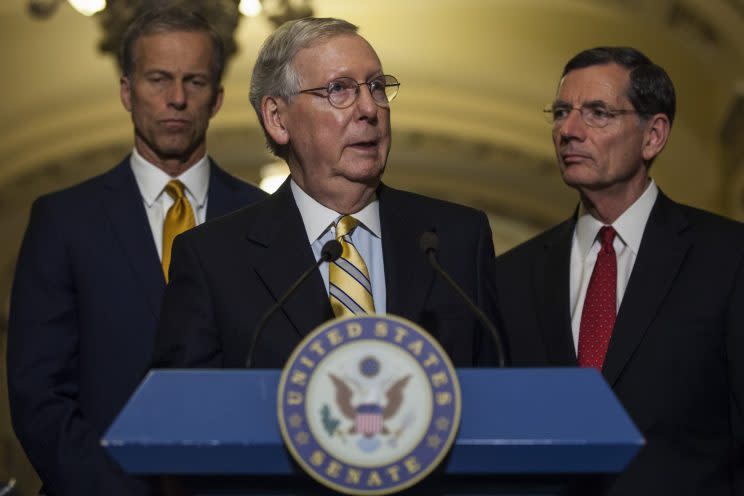
McConnell has said the Senate will not take up a health care bill before the Congressional Budget Office analyzes its potential effect on premiums. Sen. Susan Collins, R-Maine, told the Portland Press Herald last week that she would not vote for the bill without this step.
“I’m not going to vote for a bill whose impact has not been analyzed by the CBO,” Collins said. “I think that it is not a responsible way to legislate, when you don’t know the impact on cost and coverage. I always believe legislation is best crafted through the normal order. I think it’s much better to have committee consideration of bills, public hearings and to have a full debate. That’s the process for most well-considered legislation.”
But Collins, Rubio, Corker and others who have said they favor a more transparent process haven’t made that a condition of their support.
A spokesperson for Rubio directed Yahoo News to the CBS interview and did not say whether the senator would insist on public hearings as part of the process. A spokesperson for Collins did not return a request for comment.
McConnell has insisted that a vote will happen before Congress’ customary July 4 recess. But to pass a bill, he needs 50 votes, and there are only 52 Republicans in the Senate, meaning that if any two of his members wanted to take a stand for transparency, they would have the leverage to do it.
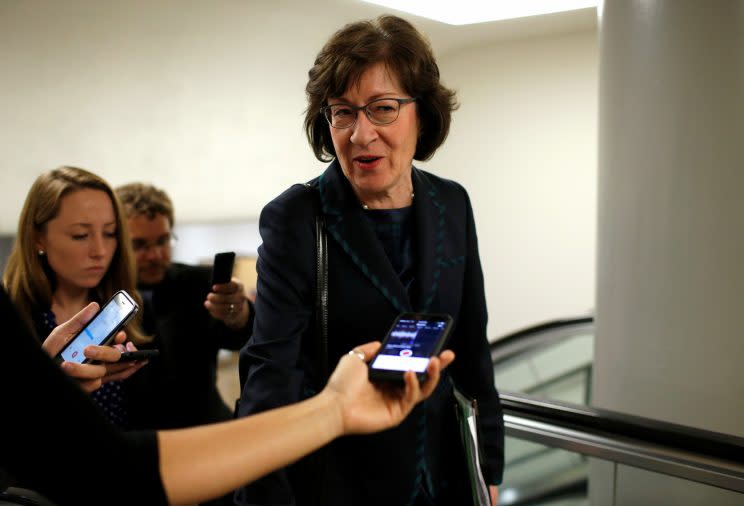
“The health care bill only gets to remain secret if Republican senators allow it to. They could force it into the sunlight if that was their desire,” Vox’s Sarah Kliff wrote Friday. “A decision not to do so is tacit consent to a closed process, no matter how much Republican senators criticize that process to the press.”
It remains to be seen if any Republicans will take a stand and demand the Senate create a more open process.
McConnell has to unify his caucus on other issues as well: Collins and Sen. Lisa Murkowski, R-Alaska, have expressed doubt about the bill’s effect on Medicaid expansion and potential defunding of Planned Parenthood. More conservative members, like Sen. Mike Lee, R-Utah, and Sen. Rand Paul, R-Ky., have called for the bill to go even further in rolling back Obamacare.
Democrats have been trying to stem the breakneck speed and hold a hearing in any of several committees. Senate Minority Leader Charles Schumer and others sent a letter to their Republican colleagues noting the plethora of hearing rooms available for a public review of the bill and committed to attending any proceedings.
“If you schedule a hearing, we guarantee all Democratic members of the Senate HELP, Finance or Budget Committee will be in attendance at any time or place that you choose,” the Democratic senators wrote, referring to three key committees that could be tasked with reviewing the bill before it hits the Senate floor.
Arguing in the letter that Democrats strove for transparency in the passage of Obamacare in 2010, the members said that a closed-door process would harm the American people.
“The American Health Care Act would fundamentally redefine health care in this country,” the letter said. “To draft it behind closed doors and pass it without one hearing is nothing short of legislative malpractice and a repudiation of all that the Senate stands for.”
_____
How the Democrats Plan to Slow GOP Health Care Bill

As the Republicans’ self-imposed July 4 deadline to repeal and replace Obamacare draws near, Senate Democrats have begun to weigh their options to keep the health care bill off the Senate floor.
The Democrats plan to take one of their first major actions against the bill Monday night by holding the Senate floor until at least midnight to urge Republicans to openly discuss their health care bill, according to Politico.
“I think that the Democrats in the Congress should do everything possible to defeat that legislation, which is, again, to my mind, unspeakable,” Sen. Bernie Sanders said on CNN’s “Face the Nation” Sunday.
Although the GOP itself seems divided about the direction of health care reform, Democrats are doing whatever they can to stop or delay the Republican bill — at least until they see it. According to Politico, Minority Leader Chuck Schumer will also lead the Democrats in shutting down the Senate by denying all unanimous-consent requests during the protest Monday night.
“Republicans are drafting this bill in secret because they’re ashamed of it, plain and simple,” Schumer told Politico. “These are merely the first steps we’re prepared to take in order to shine a light on this shameful Trumpcare bill and reveal to the public the GOP’s true intentions: to give the uber-wealthy a tax break while making middle-class Americans pay more for less health care coverage. If Republicans won’t relent and debate their health care bill in the open for the American people to see, then they shouldn’t expect business as usual in the Senate.”
Democrats could also use Senate rules to prevent committee meetings that last longer than two hours, which would make it difficult for Republicans to schedule votes on routine measures, let alone health care reform, according to Bloomberg.
Democrats, a minority in the Senate, fear their only chance to stop the Republican bill is with open hearings, allowing public opinion against it to build.
“Now, in the Senate, what you have is you have I believe it is 10 Republicans working behind closed doors to address one-sixth of the American economy,” Sanders said on CBS News’ “Face the Nation” Sunday.
“My understanding is that it will be brought forth just immediately before we have to vote on it,” he said. “This is completely unacceptable.” — Taylor Rogers
_____
House Republicans List Demands for Senate Bill
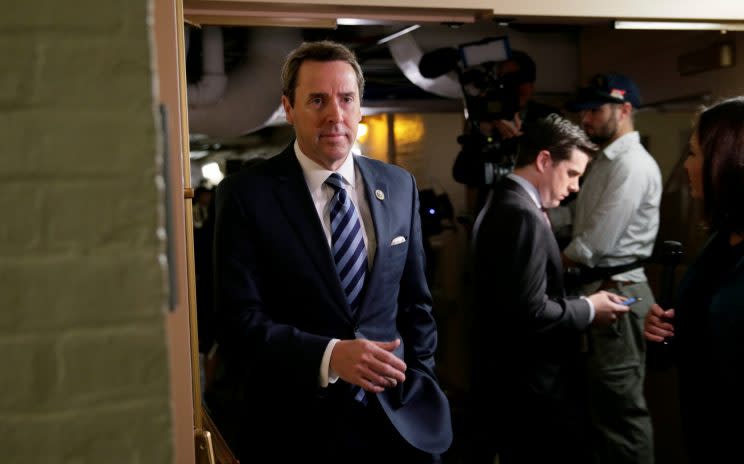
Amid mounting uncertainty over the contents of the Senate Republican’s health care bill, a group of House Republicans have taken it upon themselves to lobby for the new bill to include certain provisions from the House version of the legislation that passed in March.
“We write to express our serious concerns regarding recent reports suggesting that the Senate’s efforts to produce a reconciliation bill repealing the Affordable Care Act are headed in a direction that may jeopardize final passage in the House of Representatives,” states a copy of the letter acquired by Independent Journalism Review.
The letter, drafted by the Republican Study Committee led by Rep. Mark Walker, R-N.C., warns Senate Majority Leader Mitch McConnell that a Senate version of the bill without certain provisions central to the initial bill may not pass when it goes back to the House. The letter demands that the new bill not reward states for expanding Medicare, provide ways for states to waive certain requirements of the Affordable Care Act, repeal ACA taxes and defund Planned Parenthood for a year.
“As the Senate continues its deliberative process, we urge you to carefully evaluate the American Health Care Act and consider the important role these specific policies played in building consensus in the House,” the letter states. — Taylor Rogers
_____
Study shows House health care bill could cost 1 million jobs
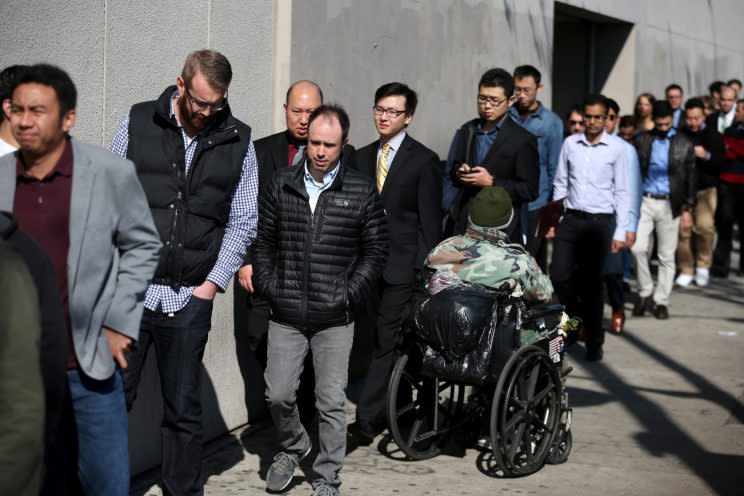
A new study reveals that the House GOP health care bill would cost Americans nearly 1 million jobs in 10 years.
The Commonwealth Fund and George Washington University researchers found that the American Health Care Act (AHCA), passed by the U.S. House of Representatives in May, would initially boost the economy and increase the number of jobs in the short term, but eventually hinder the economy and reduce the number of jobs in the long run. The House passed the bill with a series of last-minute amendments designed to win over more conservative Republicans.
“The House bill to repeal and replace the Affordable Care Act would greatly reduce the number of people with insurance coverage, effectively reversing gains made since the law’s enactment,” the study says.
“Our model basically tries to estimate [the economic effects] with a fairly detailed economic modeling system across states and across sectors,” the study’s lead author Leighton Ku told Yahoo News.
The AHCA would repeal taxes and lead to an additional 864,000 jobs in 2018, the study reads. But by 2026, those effects would be dramatically reversed as the reductions in funding for health care would hurt economic growth. The cuts to Medicaid and federal subsidies would result in the loss of nearly 1 million jobs, a business output worth $148 billion less and gross state products lower by $93 billion.
Because the bulk of federal funds used to support health care usually go toward paying health care employees and other businesses that provide services used by health care providers such as construction companies, the bill would result in a decrease in the number of jobs across sectors.
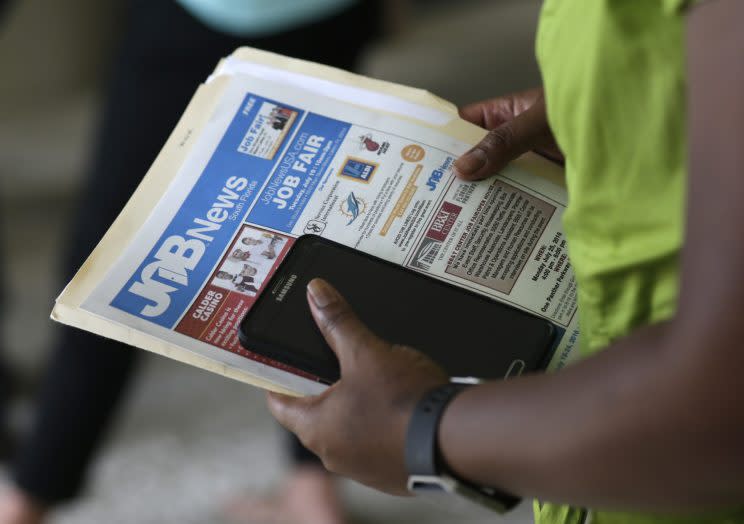
But the health care sector, which “has been one of the main areas of job growth in recent years,” would suffer the greatest decrease in jobs, losing 24,000 jobs by 2018, and see about 725,000 fewer jobs by 2026, according to the study.
“We estimate at that point that’s one in every 30 health care jobs in the country no longer exist because of the House health bill,” Ku said. “We find this phenomenon happening in nearly every state. It’s a fairly common pattern.”
The bill’s tax cuts would also benefit higher-income people at the expense of low- and middle-income people, Ku said.
“When you give tax cuts to wealthy people, that is not an effective way to stimulate the economy,” Ku said. “If you give a thousand dollars in resources to a low- or middle-income person, they’re more likely to spend the money, so that will lead to more jobs because they are consuming more goods. A billionaire is more likely to invest the money in savings.”
According to the study, states that expanded Medicaid and had received more federal funding would face the brunt of the negative economic effects, facing “faster and deeper” losses. The study considered factors that could change the economic and employment effects, such as the extent to which states gained coverage in the Affordable Care Act, the cost of health insurance per state, age structure, state population size, and tax distribution. States that would be hit the hardest include New York, Pennsylvania and Florida. Only four states — Washington, Utah, Hawaii and Colorado — would see a long-term increase in employment rates, but likely still face eventual decreases due to the spread of effects of the reductions in health care support.
The Senate is preparing to unveil its own version of the bill.
To avoid the negative economic effects predicted in the study, Ku said that future versions of the bill should rework the funding cuts and tax cuts.
“If the Senate could sort of rebalance that so that … the health care cuts are smaller and or that the tax changes benefit low or middle income people — that would help a lot,” Ku said. — Julia Munslow
_____
Trump feels ‘very good’ about Senate health care bill, whatever it is, White House says
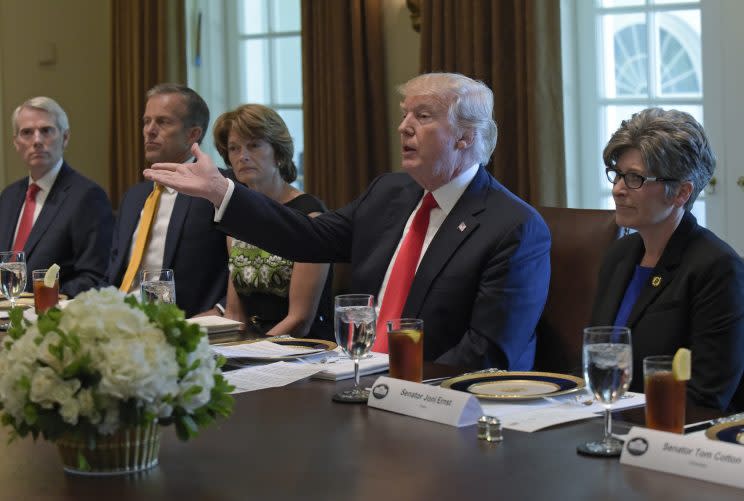
WASHINGTON — President Donald Trump feels “very good” about the Senate’s progress in drafting its own version of his signature health care bill, White House press secretary Sean Spicer told reporters Monday.
When asked if the president or members of his legislative team has seen a copy of the bill, however, Spicer said he did not know.
Spicer said the administration was confident the bill would eventually make its way to the president’s desk.
“This is something Senate Majority Leader McConnell is working very closely with the administration on,” Spicer said. “We feel very good about the progress that has been happening in the meetings.
“I know [the legislative team] is in constant contact,” Spicer said, adding that McConnell “knows his members, he knows the Senate and he knows this issue” in determining when to hold a vote.
Read more here by Andrew Bahl
_____
Read more from Yahoo News:

